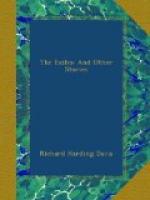THE EXILES
I
The greatest number of people in the world prefer the most highly civilized places of the world, because they know what sort of things are going to happen there, and because they also know by experience that those are the sort of things they like. A very few people prefer barbarous and utterly uncivilized portions of the globe for the reason that they receive while there new impressions, and because they like the unexpected better than a routine of existence, no matter how pleasant that routine may be. But the most interesting places of all to study are those in which the savage and the cultivated man lie down together and try to live together in unity. This is so because we can learn from such places just how far a man of cultivation lapses into barbarism when he associates with savages, and how far the remnants of his former civilization will have influence upon the barbarians among whom he has come to live.
There are many such colonies as these, and they are the most picturesque plague-spots on the globe. You will find them in New Zealand and at Yokohama, in Algiers, Tunis, and Tangier, and scattered thickly all along the South American coast-line wherever the law of extradition obtains not, and where public opinion, which is one of the things a colony can do longest without, is unknown. These are the unofficial Botany Bays and Melillas of the world, where the criminal goes of his own accord, and not because his government has urged him to do so and paid his passage there. This is the story of a young man who went to such a place for the benefit he hoped it would be to his health, and not because he had robbed any one, or done a young girl an injury. He was the only son of Judge Henry Howard Holcombe, of New York. That was all that it was generally considered necessary to say of him. It was not, however, quite enough, for, while his father had had nothing but the right and the good of his State and country to think about, the son was further occupied by trying to live up to his father’s name. Young Holcombe was impressed by this fact from his earliest childhood. It rested upon him while at Harvard and during his years at the law school, and it went with him into society and into the courts of law. When he rose to plead a case he did not forget, nor did those present forget, that his father while alive had crowded those same halls with silent, earnest listeners; and when he addressed a mass-meeting at Cooper Union, or spoke from the back of a cart in the East Side, some one was sure to refer to the fact that this last speaker was the son of the man who was mobbed because he had dared to be an abolitionist, and who later had received the veneration of a great city for his bitter fight against Tweed and his followers.




